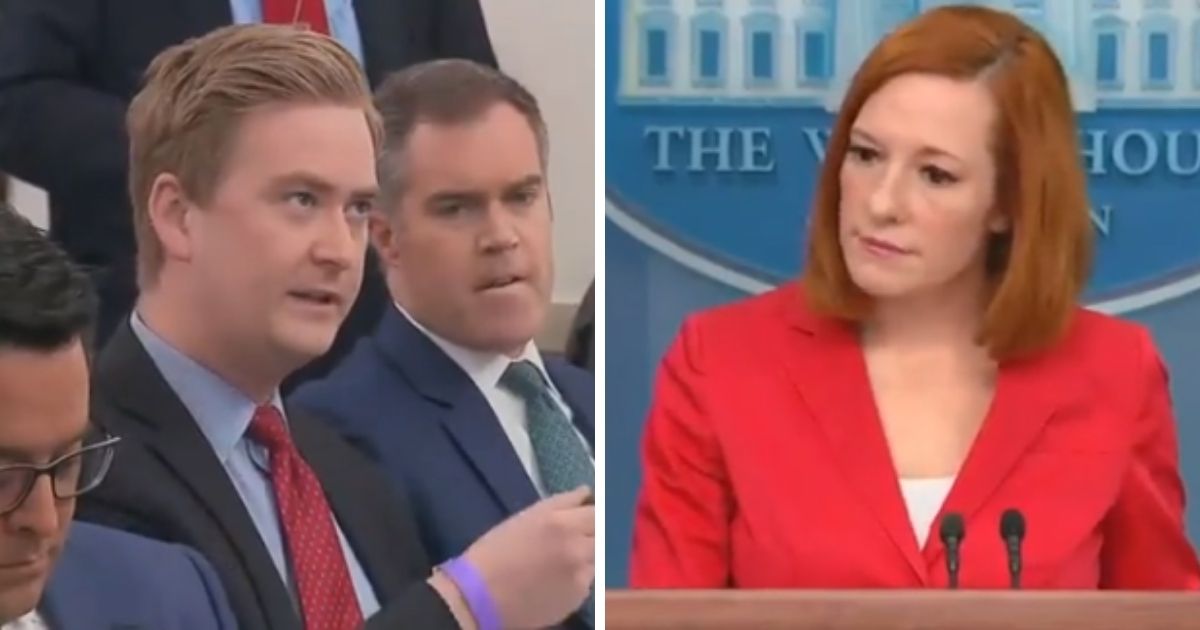As skyrocketing gasoline prices hammer consumers already walloped by inflation rates that have become a hallmark of the Biden administration, the blame dance is under way at the White House.
Federal Energy Information Administration numbers show that the average price of gas in the U.S. rose from $2.284 in December of 2020, the last full month of the Trump administration, to $3.611 in February, a 58 percent increase. Since then, prices have risen even further, with AAA putting the average price of a gallon of unleaded regular at $4.065 as of Monday.
Stopping construction of the Keystone XL pipeline was one of President Joe Biden’s first acts in office. His administration’s hostility to fossil fuel production — at least in the United States — has only continued.
But when White House press secretary Jen Psaki was asked about gas prices Monday by Fox News reporter Peter Doocy, Psaki said the increase is all Russia’s fault, thanks to Russian President Vladimir Putin’s decision to invade the neighboring country of Ukraine.
“It sounds like you are blaming Putin for the increase in gas prices recently, but weren’t gas prices going up anyway because of post-pandemic supply chain issues?” Doocy asked.
Doocy: “[Y]ou say…you’re going to do everything you can to reduce the impacts…high gas prices have…We’re asking other countries to think about…pumping more oil. Why not just do it here?”
Psaki insists “federal policies are not limiting the supplies of oil & gas” pic.twitter.com/bZGeewR6v9
— Curtis Houck (@CurtisHouck) March 7, 2022
“Well, I think that there’s no question that, as we have seen and outside analysts have conveyed this as well, the increase and the anticipated continued increase, which is I think what some of your colleagues were asking about, that is a direct result of the invasion of Ukraine, and also there was an anticipation of that,” Psaki said.
“That was factored in as gas prices have gone up,” she added.
Doocy continued to question Psaki.
Doocy: “Would [he]..undo his executive order that stops the…Keystone XL pipeline?
Psaki: “Are you suggesting that would solve the gas prices issue?”
Doocy: “Well, do you think that would maybe effect prices faster than getting the whole country off of fossil fuels?” pic.twitter.com/8NmYlr7YhA
— Curtis Houck (@CurtisHouck) March 7, 2022
“You say that you’re going to do everything you can to reduce the impact that high gas prices have on Americans,” Doocy said, “We’re asking other countries to think about maybe pumping more oil. Why not just do it here?”
“Well, to be very clear, federal policies are not limiting the supplies of oil and gas,” Psaki pushed back.
Doocy asked about whether the administration might shift its priorities.
Doocy: “You guys think that asking Saudi Arabia or Venezuela or Iran is reducing our dependence on foreign oil?
Psaki: “That’s actually — I just outlined each of those specific scenarios and the range of discussions that we’re having with each of those countries.” pic.twitter.com/qt8nPX5hlO
— Curtis Houck (@CurtisHouck) March 7, 2022
“Gas prices are approaching an all-time high per gallon. How high would they have to get before President Biden would say, ‘I’m going set aside my ambitious climate goals adjust increase domestic oil production, get the producers to drill more here, and we can address the fossil fuel future later?’” Doocy said.
Psaki said oil production in the U.S. was higher last year than in the first year of former President Donald Trump’s administration.
That’s true. In 2017, according to EIA figures, oil production the year Trump was inaugurated was 9,357 barrels per day.
Production rose the next two years, according to the EIA.
It hit 12,289 thousand barrels per day in 2019 before it dropped to 11,283 thousand barrels per day in the pandemic year of 2020, then fell again in 2021 to 11,185 thousand barrels.
Biden last month promised to cushion Americans from gas price hikes.
“I want to limit the pain the American people are feeling at the gas pump. This is critical to me,” Biden said in prepared remarks on Feb. 23, according to CNN. That was the eve of the Russian invasion of Ukraine, and prices of gas have done nothing but rise since then.
This article appeared originally on The Western Journal.
























 Continue with Google
Continue with Google